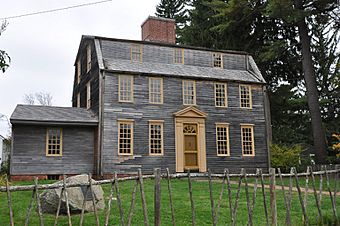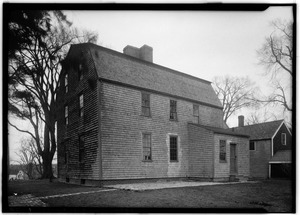Tate House (Portland, Maine) facts for kids
|
Tate House
|
|
|
U.S. Historic district
Contributing property |
|

Pictured in 2013
|
|
| Location | 1270 Westbrook St Stroudwater, Portland, Maine |
|---|---|
| Built | 1755 |
| Architect | George Tate |
| Architectural style | Georgian |
| Part of | Stroudwater Historic District (ID73000126) |
| NRHP reference No. | 70000072 |
Quick facts for kids Significant dates |
|
| Added to NRHP | January 12, 1970 |
| Designated NHL | November 11, 1971 |
| Designated CP | February 16, 1973 |
The Tate House is a really old and interesting historic house museum in Portland, Maine. It's located in the Stroudwater neighborhood, close to the Fore River. This house was built way back in 1755 for a man named George Tate.
George Tate was a former captain in the Royal Navy. He was sent to Maine to help cut down trees. These trees were special because they were used to make tall masts for ships. The Tate House is one of the oldest homes in Portland. It survived many big fires that destroyed other parts of the city. This is because it was built a bit far from downtown Portland.
The house is also part of the Stroudwater Historic District, which includes other old homes. The Tate House is very special because of its unique roof style, called a clerestory gambrel roof. This type of roof was once common but is now very rare. Because it's so unique, the house was named a National Historic Landmark. Since 1935, the National Society of the Colonial Dames has taken care of it as a museum.
Contents
Exploring the Tate House: A Look Inside
The Tate House sits on a small hill above the Stroudwater River. This river flows into the Fore River on the west side of Portland. The house is made of wood and has two and a half stories. It has five windows across the front and a large chimney in the middle.
The Unique Roof Design
What makes the Tate House really stand out is its roof. It has a special two-part gambrel shape. The lower part of the roof is steeper. It is separated from the upper part by a row of small windows. These are called clerestory windows. This kind of roof was once popular in northern New England. Today, the Tate House is one of only two buildings in Maine known to still have this design. The other is the Burnham Tavern. The outside of the house is covered in plain wooden boards called clapboards.
Inside the Historic Home
When you step inside, you'll find a classic layout for a house with a central chimney. There's a narrow entrance hall with a winding staircase right at the front. On the first floor, there are three main rooms. To the right, you'll find the living room or parlor. To the left is the dining room. A large kitchen stretches across the back of the house.
Upstairs, on the second floor, there are three bedrooms. The third floor has two more bedrooms. The main rooms downstairs have beautiful wooden panels. These panels are carved in a fancy style called Georgian. Many people believe these special carvings were brought all the way from England.
Discoveries from the Past: Archaeology at Tate House
In 2014, archaeologists did an exciting dig at the Tate House. They found many old items from the 1750s to the 1780s. These included pieces of pottery like salt-glazed stoneware from the 1750s. They also found creamware from the 1760s and pearlware from the 1780s.
One interesting find was a white piece of porcelain with tiny brass fears. This archaeological work happened before repairs began on the house's drainage system. The house had a problem where water was getting into the basement. This caused a lot of moisture, which could damage the house. Fixing this drainage issue was important to protect this historic building.
More to Explore
 | James Van Der Zee |
 | Alma Thomas |
 | Ellis Wilson |
 | Margaret Taylor-Burroughs |


